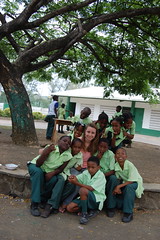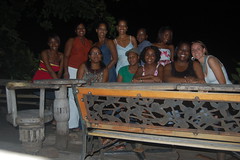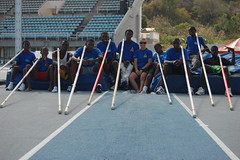
By Aria Grabowski
I am a white girl, born in America. Although I have lived in a relatively diverse area my whole life, I always was in the majority. In many ways this left me oblivious to what it means to be a minority, to be surrounded by people that do not know what it is like to have the hair of a white person. This all changed when I started my Peace Corps service and my new nickname became white girl.
I moved to a community where I was the only white person. For some of the people in the community, I was the only white person they had ever talked to in life.
In my community most people were filled with questions and amazement about my whiteness. Yes, my scalp is really white like paper. No, my hair did not come from a doll. Yes, I turn red if I stay in the sun too long. Yes, if you press my skin it will briefly change color. I do not know why my veins are that color and no I do not poop white.

At first, I found the questions, poking, and petting extremely annoying. I do not think anyone wants a stranger on the bus touching their hair. But then I realized these actions were usually not coming from a place of hate or malice. It was coming from a lack of knowledge.
I quickly realized that I not only represented Americans and the Peace Corps. I also represented white people. I needed to do everything possible to help people understand that all white people are not tourists, rich, greedy, or cheap. Not all white women are easy. We are different from black people physically. So when people asked me questions, no matter how crazy, I tried to be patient, understanding and answer questions.
Even with all my attempted patience and understanding, I realized in some way it affected how I viewed interactions with people, especially people I did not know well.

I frequently found myself thinking someone was treating me in a certain way because I was white. If a guy hit on me, I just assumed it was because I was white and a possible visa. This view came from receiving more marriage proposals from strangers than I could count. It also cam from the phrase ‘I like to see your color’ being a frequently used pick-up line. Obviously, every guy I met was not interested in that, but how could I tell?
There were other times people would try to charge me more for things and I always assumed this was because I was white. The people thought I did not know better. They thought I was rich so it was okay to rip me off. But maybe these were honest mistakes?
Then there were times people would ask me to buy stuff for them. Again, I just assumed it was because I was white and by default rich. If I did not buy, I would be labeled cheap and greedy.
As time went on, it occurred to me that their actions may not have had to do with my whiteness. It may have been based on the fact that it seemed like I had my life together, and by default, must have money.
I started to notice that I had a slight chip on my shoulder about being treated differently just because I was white. I was never certain whether I was treated this way because I was white or I was not white. It made me realize how hard it must be for minorities in the states – always wondering if that interaction was due to race and never being able to know if it was or was not.
Sadly, from my experience it seems like the only thing that can be done, is to get thick skin. Try to be patient and understanding. Try to fight ignorance, no matter how exhausting and hard it may be. I hope that one day things will be different. Granted that is easy for me to say because my experience being a minority lasted only 2+ years and for the most part did not have hatred attached to it.
By Aria Grabowski
Aria Grabowski wrote this article to discuss her experience being a minority for 2+years.She served as a peace corps volunteer in St. Lucia from Feb 23 2009-May 28 2011.
Fromgirltogirl Discussion: How do you think we can promote more patience, understanding, and acceptance of different cultures and people in communities around the world?
For more lifestyle enrichment tips, news, community empowerment,advice, and freebies visit our website Fromgirltogirl.com !
Check us out on Facebook and Twitter !
